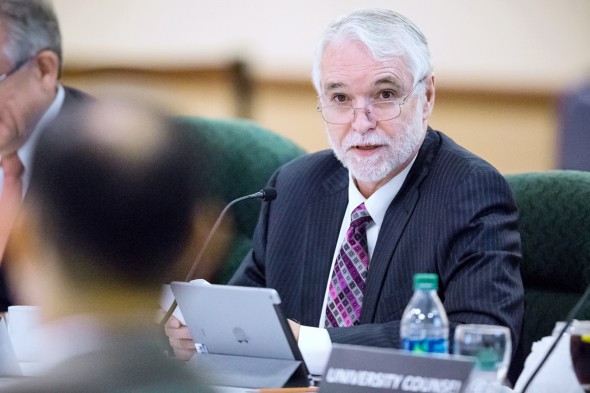Stalemate won’t affect payroll, may delay health provider payments

U of I leaders are advocating for state support, President Timothy Killeen says. Photo: L. Brian Stauffer
The state’s budget stalemate won’t affect the university’s ability to meet its payroll obligations, Chief Financial Officer Walter Knorr told trustees at their Sept. 10 meeting.
The university already covered the August payroll and promised to cover September as well.
However, the continuing budget impasse may halt payments to health care providers for services covered by employee insurance benefits, the state’s Department of Central Management Services said in a statement Sept. 9.
“All health care services will continue to be paid as long as possible. However, in the near future, we will no longer have the legal authority to continue to pay health care vendors for their services,” the statement said, adding that payments will be released after the budget is approved and funding is in place.
University officials are awaiting a budget deal among state legislators that would reveal the university’s fiscal year appropriation and allow Knorr’s office to prepare a budget based on specific numbers.
Last year’s university appropriation was around $660 million, but cuts have been proposed for fiscal 2016 ranging from 8.5 to 31 percent. The university also lost $18.4 million dollars rescinded from last year’s appropriation.
University officials have asked campus leaders to submit budgets for several funding scenarios. Knorr said despite the “profound uncertainty,” advanced planning has allowed the university to navigate difficult times. “We’ve been prepping for this for the last half-dozen years,” he said. The university instituted an administrative hiring freeze and delayed on a salary program.
Knorr said the state still owes the university $49 million for the last fiscal year and about $160 million in unprocessed bills for this year.
The state continues to pay Medicaid claims to UI Health at the 2015 rate, which trustee Timothy Koritz said could work to the university’s advantage because the 2016 rate will likely be reduced.
The state also failed to pass a capital appropriations bill, leaving the university to spend institutional money to keep building renovations going.
Knorr said the budget impasse has led to threats by bond-rating agencies to further reduce the university’s borrowing rates.
Even if the state approves the university’s appropriation soon, a university budget probably won’t be ready for trustees by the Nov. 12 meeting, he said. “We’ll continue to operate this way until further notice.”
President Timothy Killeen said university leaders continue to advocate for the university and explain how the state benefits from its work. “We’re not just waiting around to see what happens,” he said. “We’re trying to further the process.”
